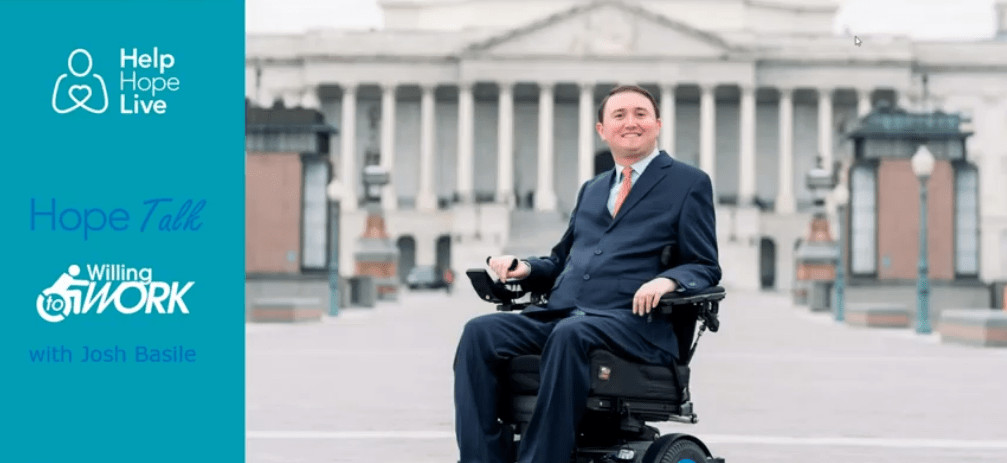Clients, Ambassadors, and partners in the Help Hope Live community are quick to point out the barriers that professionals with disabilities face, from navigating restrictive income caps for keeping their benefits to serving as a perpetual self-advocate to meet their accessibility needs at work.
In January 2022, Built In reported on how ableist attitudes can lead to unfair additional burdens for workers with disabilities through bias and discrimination. Here’s our summary, starting with a broad view of ableism, microaggressions, and language choices.
What Does Ableism Mean?
Ableism is judging a person with a disability based on a misconception, assumption, or stereotype and concluding that they are less valuable or less capable than an individual without a disability.
Ableism can come from ignorance or intention.
As our Ready to Work partner, Josh Basile, Esq., explains, before he sustained a disability himself, “I had a perspective of ‘I’m so sorry for that person.’” That feeling of sympathy comes from the misconception that someone with a disability is not capable of living a fulfilling life and deserves pity from their peers instead of respect.
Josh Basile, Esq., disability employment advocate and expert
Examples of Ableism
Here are a few common examples of ableism:
- Speaking to someone with a disability as if they were a child
- Talking loudly to someone who is blind or uses a wheelchair
- Telling someone with a disability “I don’t even see you as disabled” as a compliment
- Assuming someone who uses assistive technology is a less productive or less competent worker
- Choosing an office space that is not accessible to someone who is blind or uses a wheelchair
- Planning a get-together that someone with a disability cannot access
- Criticizing an employee for being overly sensitive or anxious without considering that they may live with a non-visible disability, such as PTSD
- Assuming an employee with a disability is a risky or expensive hire or will underperform
Direct bias and implicit bias represent different categories of ableism.
Direct bias is knowingly holding a belief that might lead you to discriminate against someone with a disability, while implicit bias is unknowingly overlooking or excluding the needs and rights of someone with a disability through lack of awareness.
What Are Microaggressions?
Microaggressions are actions or statements that perpetuate stereotypes or judgements or force people with disabilities into an outside category of “non-normal”. Here are a few examples of terms that can make people with disabilities the outsiders in a workplace or conversation:
- Lame
- Blind spot
- Falling on deaf ears
- Crippled
- Psycho
- Retarded
These terms perpetuate the idea that someone with a disability falls on the “outside” of the norm or a community, potentially leading to feelings of isolation and exclusion.
Should I Stop Saying “Disabled”?
Every person with a disability has the right to view their disability and identity in their own way.
For some people, the term “disabled” is a source of pride and a reflection of how a disability impacts their life, self, career, and advocacy efforts. For other people, “person with a disability” is the preferred language, capturing the fact that they are a person first—not a disability.
However, certain terms are falling out of use across the board because of the way that they reflect stereotypes and misconceptions.
For example, language like “differently abled” or “special needs” excludes the concept of a disability altogether, which can lead to the impression that living without a disability is the preferred or better reality.
Language choices should always come down to respecting personal preferences and boundaries. Listen to people with disabilities and honor their language choices in your communication.
Professionals with disabilities have a right to respectful communication.
How Ableism Impacts Professionals
82% of people with disabilities are unemployed.
These professionals often report lower performance expectations from managers and bias or discrimination when applying for jobs and conducting interviews.
Big corporations rarely feature leadership and management teams that include professionals with disabilities. Workers must advocate for their own accessibility and technology needs just to have the chance to perform at their full capabilities—and this advocacy must take place outside the scope of their job role, taking up valuable work time.
While the Americans with Disabilities Act prevents discrimination based on an individual’s disability and requires certain accommodations from employers, only one-third of managers say they understand these disability accommodation requirements in detail. HR departments can get stuck in an outdated framework in which discussing accommodations or other topics surrounding disability, diversity, and inclusion is still considered taboo.
A disability in no way prevents an individual from making meaningful professional or community-based contributions.
As one legal analyst points out, before the COVID pandemic, workers with disabilities struggled to secure approval from employers for working from home as a necessary accommodation. Once that need for accommodation extended to the professional population not living with a disability, however, workplaces rapidly found ways to make remote work accessible. This shift highlights a leading piece of feedback from the disability community: when we ask for something to do our jobs, it’s a problem – when someone without a disability asks for the same thing, their request is honored and fulfilled.
From meaningful exit interviews to centering company policies on the needs of employees to providing breaks in the workday and rethinking job descriptions, policy experts and professionals with disabilities have plenty of recommendations to improve access and respect.
Safe Fundraising Pathways for Professionals with Disabilities
Professionals like Daniela Izzie turn to Help Hope Live for fundraising that won't jeopardize their benefits.
One of the first considerations for professionals with disabilities is how to pursue meaningful work without losing their eligibility for state-based benefits such as Medicaid or SSDI. Our nonprofit can help.
Help Hope Live can help you establish a fundraising campaign under which the funds raised in your honor are not considered personal income or assets, protecting your benefits eligibility and your right to work as a result.
Want help navigating the process of applying for a job or securing the accommodations that you need to perform? Our partner Josh Basile, Esq., can offer firsthand insights and extensive support to our clients for free—click here to apply for assistance, and watch his Hope Talk on seeking employment:
Written by Emily Progin












